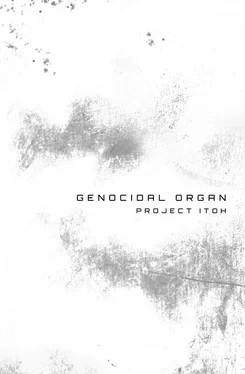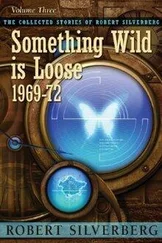Project Itoh - Genocidal Organ
Здесь есть возможность читать онлайн «Project Itoh - Genocidal Organ» весь текст электронной книги совершенно бесплатно (целиком полную версию без сокращений). В некоторых случаях можно слушать аудио, скачать через торрент в формате fb2 и присутствует краткое содержание. Год выпуска: 2012, ISBN: 2012, Издательство: Haikasoru/VIZ Media, Жанр: Старинная литература, на английском языке. Описание произведения, (предисловие) а так же отзывы посетителей доступны на портале библиотеки ЛибКат.
- Название:Genocidal Organ
- Автор:
- Издательство:Haikasoru/VIZ Media
- Жанр:
- Год:2012
- ISBN:9781421550886
- Рейтинг книги:4 / 5. Голосов: 1
-
Избранное:Добавить в избранное
- Отзывы:
-
Ваша оценка:
- 80
- 1
- 2
- 3
- 4
- 5
Genocidal Organ: краткое содержание, описание и аннотация
Предлагаем к чтению аннотацию, описание, краткое содержание или предисловие (зависит от того, что написал сам автор книги «Genocidal Organ»). Если вы не нашли необходимую информацию о книге — напишите в комментариях, мы постараемся отыскать её.
Genocidal Organ — читать онлайн бесплатно полную книгу (весь текст) целиком
Ниже представлен текст книги, разбитый по страницам. Система сохранения места последней прочитанной страницы, позволяет с удобством читать онлайн бесплатно книгу «Genocidal Organ», без необходимости каждый раз заново искать на чём Вы остановились. Поставьте закладку, и сможете в любой момент перейти на страницу, на которой закончили чтение.
Интервал:
Закладка:
Before that day, no matter how much of a bastard you were, the United States of America wouldn’t sanction an assassination attempt on you. Not officially, at least. Late last century, Executive Order 12333 reiterated President Gerald Ford’s original proscription of assassination or any government involvement in assassination. Even the Public Enemy Number One of the day—say the drug lord Pablo Escobar who flooded the US with South American drugs, or the US’s pet thorn-in-the-side dictator Saddam Hussein—however much the US might have wanted them dead, there was never any official attempt to actually assassinate them.
“No person employed by or acting on behalf of the United States Government shall engage in, or conspire to engage in, assassination.” That’s how the executive order was worded. Just words, maybe, but each president in his turn—Reagan, then Bush, then Clinton—found himself increasingly bound by their power. That’s not to say that assassinations never took place, of course, but the executive order was respected. Assassination had become a risky move politically. More trouble than it was worth. Easier and cleaner all around simply to face the enemy down: engage in formal negotiations or have a war. As a political tool, assassination just didn’t have the priority it used to. Unless it could be guaranteed top secret, it just wasn’t worth it anymore.
After all, couldn’t the US start a war with anyone they wanted to? All they needed to do was find some pretext. The bar was much lower than assassination. Far easier to convince the media that we should kill large numbers of people “fair and square” than it would be to try and explain away a botched assassination attempt. Who was it who said that a single death was a tragedy but that a million deaths was a statistic? Well, either way, it was easier to paint yourselves as the “good guys” when you killed tens of thousands—who must therefore have been bad—than when you killed an individual person. This was what the world used to be like anyway.
Everything changed the day we were attacked on home ground. Things started heating up. I wouldn’t go as far as to say that assassination was now back in as the flavor of the month, but within the halls of power in Washington it was at least back on the table as an option. A worthy contender. A necessary evil in the war against terror, in the fight for humanity. That’s how they’ve explained it. The dark arts that EO 12333 were supposed to have suppressed forever reemerged into the light of day.
And that, more or less, is how I ended up as an assassin.
Not because I’d particularly wanted to—it was just that my job seemed to involve increasing work of that sort. I had duties besides killing, of course. But we in Special Operations I Detachment had sole responsibility for all the assassination jobs parceled out by USSOCOM—the Unified Combatant Command that oversaw the various Special Operations Commands for the US Army, Air force, Navy, Marines, and Intelligence. Back last century the Green Berets sometimes used to get involved in that sort of work, as did that US Army detachment called Delta Force. But now, in the twenty-first century, it’s basically taken care of by us “Snake Eaters” in Intelligence. So much so, in fact, that the guys from the LRRP in the Marines and the Navy SEALS had contemptuously started referring to us as “wet boys”—a nickname derived from “wet work,” the Cold War–era euphemism for assassination. Novelists like Graham Greene and John le Carré used the term a lot.
Think of that famous poster for the film Carrie . Poor, abused Sissy Spacek, standing petrified, doused from head to toe in pig blood. Same for us, only in our case it was human blood we were drenched in. The official headhunters of the United States of America. Or, as Intelligence had named us, Special Operations I Detachment.
And that’s pretty much how I’ve come to be sitting here in the belly of this Flying Seaweed Craft, double-checking the files on our next target.
The face, name, movement patterns, household setup, political leanings of our target were all here, collected in a single file. The next person we were going to kill. We had all sorts of observation techniques drummed into us during our Special Forces training. After all, we aren’t just about blowing things up. No more wham, bam, thank you Uncle Sam. These days, we were usually tasked with jobs along the lines of training allied forces in developing countries or winning the hearts and minds of locals through medical care, education, and propaganda. In other words, this job was a lot about the “soft skills” and not as suited to the cliché of the grizzled, misanthropic lone wolf as is often imagined. Those sorts usually became mercs instead—although in all honesty, mercenaries often ended up as tactical advisors for the armies in these Third World countries as well, so their job wasn’t all that different from ours.
In addition, we in Special Operations I Detachment had to undergo a rigorous program of psychological training to enable us to grasp a person’s character based on a cold reading of their psychometric graphs. You see, the assassination game was still a particularly delicate business—even though the level of political risk, ethical bias if you will, had grown more manageable. The world may have moved on from EO 12333, but there were still a shitload of CIA operations that had failed miserably. No, this was no gig for amateurs.
Bungled CIA ops were referred to as “paramilitary operations,” but really they were just playing Cowboys and Indians. And so it came to pass that a new category of forces was formed—Intelligence, specifically the Special Operations Branch with its Special Operations I Detachment. A military department that took over the CIA’s former remit in intelligence gathering. A sort of soldier-sailor-tinker-spy hybrid. The way the twenty-first century was panning out, intelligence activity was much more relevant in a military context than a civilian one anyway. Military intelligence is a moveable feast, and anywhere and everywhere was a theater of war these days.
Things just ain’t what they used to be, you see. There’s always that element of uncertainty that needs to be factored in. And because the name of the game was now all about trying to predict and manage that uncertainty on the one hand, and to adapt when that uncertainty did rear its ugly head on the other, it made sense for Special Forces personnel to have a clear mental image of the sort of person their target was.
In other words we needed to be able to apprehend, down to the last vivid detail, the personality of the person we were about to kill: what he was like, how he led his life. We had to walk a mile in the other person’s shoes, building our empathy with them to a crescendo—and then kill them. A task fit for a sadist. The stuff a Nazi’s wet dreams are made of. So why did this sort of work not cause us to go mad with psychological trauma of our own? One reason, and one reason only: Battle Emotion Adaptive Regulation. A powerful combination of pre-combat counseling and mind treatment that would “configure” our emotions, our morality. This allowed us to draw a clear dividing line between our personal ethics and our duty. Orwell’s “doublethink” made a banal reality by technology.
So: when I looked down at the data of my next target, I wasn’t doing so with any trace of pity or compassion for him. Rather, I was thinking about the last person I killed. My mother.
The land of the dead. It came to call on me, to pay a visit, to scratch away at the surface of my heart—only to fade away again as I opened my eyes.
In the land of the dead, there were a number of variations on a theme.
The version that haunted me incessantly was that of the hordes of decomposing dead trundling across an endless plain in a line stretching out for all eternity. There were others too: the graveyard that seemed to sprawl out forever, each former inhabitant sitting atop its grave, waiting in endless tedium. Then there was the version I experienced regularly just after my mother died: the almost comical scene of a hospital ward populated entirely by patients who were already dead. This was the one that hit home the most. I guess because it was a direct projection of my emotional state the moment after my mother died.
Читать дальшеИнтервал:
Закладка:
Похожие книги на «Genocidal Organ»
Представляем Вашему вниманию похожие книги на «Genocidal Organ» списком для выбора. Мы отобрали схожую по названию и смыслу литературу в надежде предоставить читателям больше вариантов отыскать новые, интересные, ещё непрочитанные произведения.
Обсуждение, отзывы о книге «Genocidal Organ» и просто собственные мнения читателей. Оставьте ваши комментарии, напишите, что Вы думаете о произведении, его смысле или главных героях. Укажите что конкретно понравилось, а что нет, и почему Вы так считаете.












